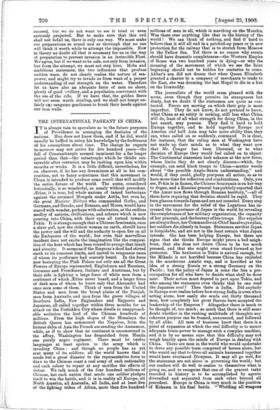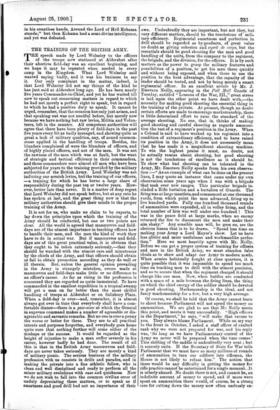THE INTERNATIONAL PAGEANT IN CHINA.
IT is always vain to speculate as to the future purposes of Providence in arranging the destinies of the nations. Mau does not know them, and if he did, would usually be baffled in using his knowledge by the feebleness of his conceptions about time. The change he expects to-morrow may not arrive for five hundred yearsâthe fall of Constantinople seemed imminent for a far longer period than thatâthe catastrophe which he thinks con- ceivable after centuries may be rushing upon him within months or weeks. It is a little difficult, nevertheless, for an observer, if he has any dreaminess at all in his com- position, not to fancy sometimes that this movement in China is intended to produce some result that will modify the entire future of the world. The scene, considered historically, is so wonderful, so nearly without precedent. iEtius, it is true, led whole nations of tamed barbarians against the untamed Mongols under Attila, but even he, the great .11agister _Wilton who commanded Goths, and Germans, and Greeks, and Romans, and Moors, would stared with wonder, perhaps with admiration, at the endless medley of nations, civilisations, and colours which is now pouring into China, with their eyes all turned towards Pekin. It is strange enough that a Chinese Semiramis, once a slave girl, now the richest woman on earth, should have the power and the will and the audacity to open fire on all the Embassies of the world ; but even that marvellous incident does not excite the imagination like the composi- tion of the host which has been roused to avenge that insult and atrocity. It seems as if the Empress's deed had stirred earth to its remotest limits, and moved to vengeance races of whom its performer had scarcely heard. In the force now besieging the Pink Palace not only are all the Great Powers of Europe represented, Englishmen and Russians, Germans and Frenchmen, Italians and Austrians, but by their side is fighting a large force of white men from a continent of which 2Etius never heard, and a larger force of dark men of whom he knew only that Alexander had once seen some of them. Think of men from the United States and men from the broad plains of the Punjab, men from Australia and men from the green villages of Southern India, New Englanders and Rajpoots and Japanese, all called together within three months for an attack on the Forbidden City where dwells in unapproach- able seclusion the lord of the Chinese hundreds of millions. From the high slopes of the Himalaya the British Queen has summoned the Nepalese, from the hottest delta of Asia the French are sending the Annamese, while, as if to show that no continent is unconcerned in the affray, Washington has despatched from Manila one purely negro regiment. There must be twelve languages at least spoken in the army which is ⢠invading China ; and though no people has as yet sent many of its soldiers, all the world knows that it needs but a great disaster to the representative force to draw to the Chinese coast a real army of each nationality and each colour to repair at any sacrifice the effects of defeat. We talk much of the four hundred millions of Chinese, but each nation that sends one soldier pledges itself to win the battle, and it is in reality all Europe, all North America, all Australia, all India, and at least five of the fighting tribes of Africa, more than five hundred millions of men in all, which is marching on the Manchu. Was there ever anything like that in the history of the world ! We can think of nothing, and find it hard to believe that it will all end in a patched-up peace or in new protection for the railway that is to stretch from Moscow to the Yellow Sea. Yet there is no reason why events should have dramatic completenessâthe Western Empire of Rome was two hundred years in dyingâor why the meaning of the movement of which we see the faint beginning should not be hidden for centuries to come. Akbar's son did not dream that when Queen Elizabeth granted a charter to a company of merchants to trade to the East, she was dooming the last Mogul to die in a but on the Irrawaddy.
The journalists of the world seem pleased with the scene, even though they perceive its strangeness but dimly, but we doubt if the statesmen are quite as con- tented. Forces are moving on which their grip is most imperfect. They do not know, do not pretend to know, what China as an entity is seeking, still less what China will do, least of all what strength for doing China, in the last resort, may possess. They find it hard to hold Europe together, and to hold together Europe and America and half Asia may take more ability than they can, when called on so suddenly, command. It is clear, for instance, that the ruling men at Washington have not made up their minds as to what they want now that Mr. Conger has been liberated, or to what decision of Europe they would feel called on to object. The Continental statesmen look askance at the new force, whose limits they do not clearly discernâwhich, for example, can send black troops to Chinaâmutter words about " the possible Anglo-Saxon understanding," and would, if they could, gladly postpone all action, so as to have more time for reflection and combinations. Only, you see, Pekin is in flames, the Chinese Semiramis is on her way to Segan, and a Russian general has publicly reported that " the Amur now flows through Russian territory,"âall of them facts requiring that decision should be rapid. They turn glances towards Japan and are not consoled. Every step in the movement for the relief of the Legations has in- creased the importance of Japan in the world by revealing the completeness of her military organisation, the capacity of her generals, and the bravery of her troops. Her supplies are always there, her Commander-in-Chief has always a plan, her soldiers die silently in heaps. Statesmen see that Japan is formidable, and are not in the least certain what Japan intends. She has been helping Europe, but there are signs that she thinks Europe might prove a bad neigh- bour, that she does not desire China to be too much pressed, and that she might even stand forward as her protector. The hesitation in Tokio is natural enough, for the Mikado is not horrified because China has exploded in the murderous Asiatic way, and is horrified at the idea of a strong Russia or a strong Germany on the Pacific ; but the policy of Japan is none the less a pre- occupation for all who have to decide what shall be done next. Their action must depend in part upon Tokio, and who among the statesmen even thinks that he can read the Japanese soul ? Then there is India. Did anybody in Europe ever realise before how strong India is even when acting alone, how easily she sends out thirty thousand men, bow completely her great Barons have accepted the leadership of the Empress ? Altogether there is much to be thought of, too much; so much that there is still some doubt whether in the rushing multitude of thoughts any coherent purpose can be framed, announced, and followed by all alike. All men of business know that there is a point of expansion at which the real difficulty is to secure adequate brain-power to manage such a complex machine, and it is by no means sure that this difficulty may not weigh heavily upon the minds of Europe in dealing with China. There are men in the world who would undertake to drive any possible team composed of horses alone, but who would say that to drive all animals harnessed together would have overtaxed Dionysus. It may all go well, for the statesmen are not alone in governing the world; but our readers will do well to realise to themselves what is going on, and to recognise that one of the gravest tasks recorded in history is to be accomplished by agents diversified and separated from each other beyond all precedent. Europe in China is very much in the position of Kehame, in his final battle. " Wielding all weapons in his countless hands, Around the Lord of Hell Kehama stands;" but then Kehama had a semi-divine intelligence, and yet was defeated.



































 Previous page
Previous page